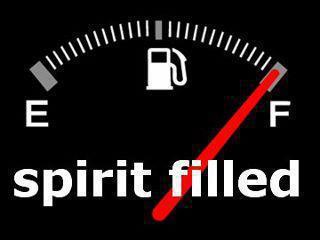What it means to be filled with the Spirit (Ephesians 5:18)
-Not drunk with wine
-But filled with the Spirit

The following comes from the minds and thoughts of nearly every Christian. See if you can hear yourself.
I just can’t seem to get victory over this certain sin in my life. I mean, I want to stop, but no matter how hard I try, I just can’t.
I do fine for a while, but then, it’s back in my life with a vengeance! It seems like it’s trying to make up for lost time.
Oh, I know we are told that God will not give us a temptation stronger than we can bear, but, well, I don’t know. I wonder sometimes if He’s misjudged my strength. I fall so easily.
And yeah, I pray. I read my Bible. I try to do what God wants.
But sometimes, my prayers don’t seem to get above the roof. Sometimes, my Bible seems like a bunch of gibberish. Sometimes, I hate being around other Christians.
Other times, I don’t feel any connection to God. I don’t feel like He’s real to me or that He’s even with me.
I remember when I first became a Christian. Everything was great for a while. I thought I could turn the world upside down. I had a whole new outlook on life. There was excitement when I read the Bible and prayed.
But not anymore. Maybe I just need to stick it out for the long haul, but maybe, on the other hand, I need something new.
I wonder if I’m missing something.
Any of that sound like you? Have you ever found yourself thinking similar thoughts? If so, I’ll tell you now—all of us have them. They’re normal. Even the apostle Paul had them. If you don’t believe me, read it for yourself sometime in Romans 7.
But Paul had the answer. He goes on and on in Romans 7 about how he cannot seem to get victory over sin, and how trying to obey the law only made things worse. And just when you think Paul is at the point of despair, and he cries out, “O wretched man that I am! Who will deliver me from this body of death?” (Rom 7:24) he gives the answer that we are all looking for.
Romans 8:1. “There is therefore now no condemnation for those who are in Christ Jesus, who do not walk according to the flesh, but according to the Spirit.”
I believe that every Christian who has feelings as I have just described is missing something, and it is what Paul mentions here in Romans 8:1, and what we are going to look at today in Ephesians 5:18.
What is it that many of us are missing? The answer is the Spirit-filled life.
 As we work our way through the book of Ephesians, which is a book about how the church should live and act, we come now to a vitally important passage on how to live the victorious and meaningful Christian life.
As we work our way through the book of Ephesians, which is a book about how the church should live and act, we come now to a vitally important passage on how to live the victorious and meaningful Christian life.
Last week, we began a section which starts in Ephesians 5:15 and goes all the way through Ephesians 6:9 about how to walk carefully as Christians in this world.
And we saw in Ephesians 5:15-17 the first step to walking carefully, which is knowing the will of God. How are we to know how we should live in this world, if we don’t know God’s will?
Today, we’re going to see the second step to walking carefully, and many people who have discovered the Bible as the means for knowing God’s will, are still missing out on this second step.
This vitally important step is being filled with the Holy Spirit. Look at Ephesians 5:18 with me.
Ephesians 5:18. And do not be drunk with wine, in which is dissipation; but be filled with the Spirit,
Ephesians 5:19 simply tells us what being filled with the Holy Spirit is and, incidentally, as we’ll see, how to be filled with the Holy Spirit.
Let me provide a little background for you, however.
Some people in the days of Paul, and I’m told, even in some cultures today, believed that the spirit world could be entered through drunkenness. If you wanted to contact the spirits, or a dead ancestor, all you had to do was get drunk.
The Greeks even had a god of wine called Dionysus, and they believed that when you got drunk, this god came and inspired you or possessed you to do and say certain things.[1]
Paul is going to show us in Ephesians 5:18 that the Spirit-filled life is not gained through such methods. And he does so with a contrast. First, he says, do not be drunk.

Do not be Drunk
Ephesians 5:18a. And do not be drunk with wine, in which is dissipation;
I think it goes without saying that while Paul mentions only wine here because it was the most prominent alcoholic beverage of that day, we can also include in this verse beer and hard liquor. I can just see someone trying to justify their getting drunk with beer because Paul only mentions wine here. No. The point is getting drunk—not necessarily what method you use.
Now we read a verse like this, and immediately, some of us are asking, “Well, ok, getting drunk is out, but what about drinking?”
Well, just so you know, that issue is not even what Paul is addressing. It is not the point of this verse. But I know that some of you are asking this question, so I’m going to very briefly share with you what I believe the Bible teaches on this subject.
At the risk of being misunderstood and oversimplifying the issue, let me just say one thing. It seem that Biblically, whether a Christians can drink or not is a “meat sacrificed to idols” issue.
What is that? 1 Corinthians 10 and Romans 14 spell it out quite clearly. Look at those passages later, but let me apply them for you regarding the issue of drinking.
The Bible nowhere says “Don’t drink” and it nowhere says “You can drink.” So what happens is that each one of us develops individual convictions and opinions about these things.
Some think its okay to have a glass of wine with meal, others don’t. Some think that a glass of wine is okay, but not hard liquor. Others see nothing wrong with having a mixed drink. Each one of us has different convictions about these things.
So how can we all get along? Well, the principle in 1 Corinthians 10 and Romans 14 is that those who feel it’s okay, should not look down upon those who don’t and shouldn’t try to get them to join you. If you lead them into these areas, while it is not a sin for you—it may be sinful for them.
At the same time, if God has not given you the liberty, you must not condemn or look down upon those who have the liberty, or try to get them to conform to your standards.
Paul says in Romans 14:4, “Who are you to judge another’s servant? To his own master he stands or falls.”
But enough about this. That is not the point of Ephesians 5:18.
Paul says do not be drunk with wine, in which is dissipation.
The key to understanding Ephesians 5:18 is found by understanding what it means to be drunk and understanding what dissipation is.
They are the same idea. Dissipation comes from the Greek word asotia. We sometimes call a drunkard a sot, and that is where this term comes from. It means reckless living, riotous living. To live out of control.
It’s used this way several times in Scripture. In Luke 15:13, and the story of the prodigal son, we read that he squandered his share of the inheritance in wild and riotous—asotia – living.
In Titus 1:6, we read that one of the requirements for being an elder in the church it to not be this way, to not be given to dissipation, reckless living, drunkenness.
This word also is used in 1 Peter 4:4 to describe the world and the way it lives. Reckless living. Out of control.
Now frequently, this word is used in relationship to having too much alcohol—to getting drunk, as it is here in Ephesians 5:18.
After mentioning drunkenness and dissipation in Ephesians 5:18, Paul commands us to be filled with the Spirit.
He puts drunkenness and being filled together because there is a comparison between the two and several contrasts. Let’s look at the comparison first.
“A person who is drunk … is ‘under the influence; of alcohol; and … a Spirit-filled Christian is under the influence and power of the Holy Spirit.”[2]
But there the similarity ends. There the comparison ends, and the contrast begins.
While being filled with the Spirit is similar to getting drunk in the sense that it is an issue of being controlled, “it is a serious mistake to suppose that to be filled with the Spirit … is a kind of spiritual [intoxication] in which we lose control of ourselves.
As we’ll see more clearly next week, when the Spirit controls us, we do not lose self-control. Rather, we may actually think we are the most self-controlled we have ever been.
There are other contrasts as well. For example, did you know that from a pharmaceutical perspective, alcohol is a depressant? Pick up any pharmacy book, and look up “alcohol” and it will be listed under the depressants, not the stimulants.
This seems strange, because it sure seems to us that when people drink too much alcohol, they sure get happy and excited—for the most part, and for a while—they’re not too happy the next morning—but it seems to us that alcohol is a stimulant.
But let me explain this to you. Alcohol is considered to be a depressant because it lowers, reduces, or weakens the most important parts of the brain. Those parts of the brain which give a man self-control, wisdom, understanding, discrimination, judgment, balance, and discernment are numbed by alcohol. People who are under the influence of alcohol lose their inhibitions.
A man who is drunk loses control to alcohol. But what is a man who has no self-control, no wisdom, no understanding, no discrimination, no judgment, no balance, and no discernment? He’s a fool!
We all admire men of judgment, and men of self-control. We want to talk to men of discernment and wisdom. But a drunk person has given all of that up. A drunk person has given up all of what gives them dignity.
And what is left behind? Just the base emotions and desires. They behave like animals. In fact, worse than animals. Excessive alcohol turns a man into a beast. It dehumanizes.
What the Spirit does, however, is the exact opposite. When the Spirit controls a person, they become their best and their highest. They become what all people are meant to be. Rather than depress the highest part of the brain, the Holy Spirit stimulates it!
The Holy Spirit stimulates every part of us. Our intellect, our emotions, and our will. Christians have accomplished some of the greatest and best intellectual discoveries and achievements throughout time. Some of the best and most moving poetry and art has been created by Christians. Some of the best advances in medicine have resulted from the work of Christians.
The effects of the Holy Spirit do not weaken the mind the way alcohol does, but strengthens and develops it to be all that it can be.
But these are all results of being filled with the Holy Spirit. And I want to save them for next week.
Paul has given us the comparison and the contrast, now let’s look at how to be filled with the Spirit.

Be Filled with the Spirit
Ephesians 5:18b. … but be filled with the Spirit,
Let me state a few items of clarification about being filled with the Holy Spirit before we see how.
First of all, it is not “getting the Holy Spirit.” I sometimes hear Christians ask one another “Do you have the Holy Spirit?” Now I am not exactly sure what they mean by this because there are many different terms in Scripture regarding the work of the Holy Spirit in our lives, and nowhere is it described as “getting” the Holy Spirit.
There are numerous things the Holy Spirit does for the believer. According to the Bible, there are four instantaneous, automatic and permanent works of the Holy Spirit upon the new believer in Jesus Christ. They spell the acrostic RIBS: Regeneration, Indwelling, Baptizing, and Sealing. All four of these happen the moment you believe in Jesus for eternal life.
But there are many more things that the Holy Spirit can do for the Christian, but which are dependent upon the believer’s actions or will or faith. Some of these include empowerment for service, empowerment for sanctification, the illumination of the Word of God, and intercession before God.[3]
It is the filling of the Holy Spirit, however, which seems to confuse the most people. There is so much disagreement and different opinions out there on this one issue, but everyone agrees on one point: Whatever the filling of the Spirit is, it is vitally important for the Christian who wants to be successful in their Christian life, and who wants to be used by God, and who wants their life to be everything God desires.
I would say that filling of the Holy Spirit is both the least understood aspect of the work of the Holy Spirit, and at the same time, the most important. How sad that is. But I think it is those areas that are so important which become so muddled because the enemy tries to keep us from doing them.
 It’s like prayer. We all know prayer is important. We all know is the lifeblood of the church. We know that it is prayer that will accomplish great things for God. But how many of us really pray. I mean more than just a prayer before meals and a prayer before bed. I mean really pray, intercede, cry out to God, plead, request, beg, get on our knees, and on our faces if we have to before God.
It’s like prayer. We all know prayer is important. We all know is the lifeblood of the church. We know that it is prayer that will accomplish great things for God. But how many of us really pray. I mean more than just a prayer before meals and a prayer before bed. I mean really pray, intercede, cry out to God, plead, request, beg, get on our knees, and on our faces if we have to before God.
Why is this? Because the enemy knows how important prayer is, and so he does everything he can to keep us from it. This is the same with the filling of the Holy Spirit. The enemy knows how important it is, and so he does everything he can to keep us from it.
If you want victory, and growing maturity, and success, excitement, joy and satisfaction in your Christian life—you need to be filled with the Holy Spirit. There are no other ways. It is that important.
But when you compare the various Scriptures in the Bible which talk about being filled, we see that a person can be filled again and again, and they can sometimes be not filled.
This shows that being filled by the Spirit is not the same thing as receiving the Spirit. We receive the spirit, that is, He indwells us (the I in RIBS) the moment we believe in Jesus for eternal life. It is a one-time indwelling, and it cannot be lost, reversed, or repeated. But according to Scripture, being filled with the Spirit is something that can happen after you have believed, and can happen many times.
We also know that being filled with the Holy Spirit does not mean that you get more of Him. When you became a Christian, you were given all of the Holy Spirit. Romans 8:9 says that Christians have the Spirit. So when you are filled, you are not getting more of the Spirit, because you already have all of Him and you can’t receive more than all.
So being filled with the Spirit is not an issue of quantity—how much of the Holy Spirit you have. It’s not an issue of quantity, because you have all of Him.
No, the issue here is control.
The question in regard to filling that we need to ask is not, “How much of the Holy Spirit do I have?”, but rather “How much of me does the Holy Spirit have?”
Let me just boil it all down for you: If you are filled by the Holy Spirit, you are simply being controlled by the Spirit. That’s it.
What does it mean to be filled by the Holy Spirit? It means to be controlled by the Spirit. It means that the Spirit has all of you and is guiding your words, thoughts, and actions.
And here’s how it happens. Ephesians 5:18 says, be filled. This is a very interesting construction in the Greek. It is a present passive imperative. I know that’s a mouthful, so let me explain to you what that means.
First the phrase be filled is in the present tense. This tells us that this filling is not a one time, or once-for-all experience which happened to us in the past, or might happen to us in the future. No, it is in the present tense, so it could be translated, “keep on being filled.” Keep on being continually replenished with the Holy Spirit.
But secondly, it is in the passive voice. This shows us that being filled is not really something you can do to yourself. You do not wake up one day and say, “Today, I’m going to get filled with the Spirit.” No, if that were the case, the word would be in the active voice. But it is passive. It is something done to you.
But finally, and here’s the curious part, it’s an imperative. That means that this is a command. It is something God commands us to do. He is saying be filled. You must keep on being filled. The Bible nowhere commands us to be regenerated, indwelled, baptized or sealed by the Holy Spirit, because these are automatic. But here we have a command to be filled because unlike these other works of the Holy Spirit, filling is not automatic.
So this is curious to me. Think about it. God commands us to be filled, but in so doing, hints that there’s really not a whole lot we can do about it.
Do you see the dilemma? How can we do something we can’t really do? How can we do something that is done to us?
Some of the books I have read about how to be filled with the Holy Spirit provided three, five or ten steps to take in order to get filled with the Holy Spirit. These tended, in my opinion, to place too much of an emphasis on the imperative aspect—on the command to be filled. They saw the command, and said, “Ok, I want to be filled. What can I do?”
These steps to take ranged from having someone pray over you and lay their hands upon you, to repenting of all known sin, submitting your life and will to God, praying to be filled, dedicating your life, and so on. These, I felt, tended to overemphasize the command to be filled.
But then, I read several books which seemed to overemphasize the passive aspect. They tended to say, “Well, you just need to sit back and wait for it. Don’t search for it. Don’t ask for it. Don’t pray for it. If God wants you to be filled, He will fill you, and He’ll do it when He’s good and ready.”
But the filling of the spirit is both a command we are to follow, and a passive activity that happens to us. In other words, there are things we can do to prepare ourselves for the filling of the Spirit, and we should do those. But we can never command or order the Spirit to fill us. We will be filled by the Spirit when God is ready to fill us with His power for some divine task or purpose He has in mind for us.
So what can we do as we wait for the filling of the Spirit? It’s not tricky or mysterious. There are three good texts from Scripture about how to prepare ourselves for the filling of the Spirit.
First, as always, let’s look at the context of Ephesians 5:18.
Paul has just told us in Ephesians 5:17 to understand what the will of the Lord is. How do we do that? Well, by reading and studying and obeying the Word of God. Remember? “Usim and Thummim.” And then, immediately following Ephesians 5:17, Paul gives us the verse we have looked at today about being filled with the Holy Spirit.
So we see in context, that somehow, knowing and obeying God’s Word are connected with being filled with the Spirit. Keep that in mind.
We see something similar over in Colossians 3:16-17. Ephesians and Colossians are almost identical books, they talk about the same things in the same order, but in a slightly different way. So sometimes, it helps to compare the two if you are struggling with a verse in one or the other. Very similar to how you should study the Gospels.
Look what Paul says here in Colossians 3:16-17: “Let the word of Christ dwell in you richly in all wisdom, teaching and admonishing one another in psalms and hymns and spiritual songs, singing with grace in your hearts to the Lord. And whatever you do in word or deed, do all in the name of the Lord Jesus, giving thanks to God the Father through Him.”
And then Paul goes on to talk about submitting to one another, just as he does in Ephesians 5.
 So you can see that these are almost identical passages. But what is the one main difference?
So you can see that these are almost identical passages. But what is the one main difference?
Back in Ephesians 5:18, Paul tells us to be filled with the Spirit, and if we do, then the very same things will be accomplished as Paul lists here in Colossians 3.
But do you see what he says causes these things here? Not the filling of the Spirit, but the Word of Christ dwelling in you richly. These two things, the filling of the Spirit and the Word of Christ which is the Bible, achieve the same result, and so somehow they are connected.
To see this in action, let us turn to the third text which reveals truth about the filling of the Holy Spirit: Acts 2. Acts 2 begins by saying that on the day of Pentecost, all the disciples were in one place, and they were in one accord. From other similar passages, we know that when the disciples gathered like this, they focused on studying the Scriptures, praying for one another, and encouraging each other.
And in this instance, as they were there, the Holy Spirit came upon them, and Acts 2:4 says that they were all filled with the Holy Spirit. Something very similar happens again over in Acts 4:31.
The point is this: It appears that filling yourself with the Word of God is a necessary step to being filled with the Spirit of God. In other words, the Spirit of God fills those who fill themselves with Scripture. We come under the power and control of the Holy Spirit when we place ourselves under the authority of Scripture.
So, how do you get filled with the Holy Spirit? You prepare yourself by being filled with Scripture. And how does that happen? By reading, studying, and obeying it.
Paul builds on this exact idea later in Ephesians 6:17 when he says that the sword of the Spirit is the Word of God. If you do not know Scripture, and are not studying, learning, and obeying the Bible, then this means you do not have the Sword of the Spirit within you, which means there is no way for the Spirit to take up the sword and use it in the Spiritual battle. You must arm yourself with the sword of the Spirit, which is the Word of God, before the Spirit can fill you and control you in our daily battle against spiritual forces.
So study the Bible, believe it, and obey it. As you do, the Holy Spirit will fill you also. The two are intricately connected. As you soak up the Word of God daily, you will become soaked with the Holy Spirit. As you fill yourself with the Word, you will be filled with the Spirit as well.
Note that knowing the Bible is not the same thing as being filled with the Spirit. They two are complimentary; not synonymous. One can be a Bible expert, but be far from being filled.
Now, how can you know whether or not you are filled with the Spirit? It’s not because you speak in tongues, or roll around on the floor in a church service. There are clear signs that someone is filled with the Spirit, and we will begin to see next week what these are when we look at Ephesians 5:19.
[1] Bible Background, 550.
[2] Stott, 204.
[3] Erickson, Theology, 873-875.




St Peter say in Acts Repent and be baptized in the name of the LORD Jesus Christ
and you will be filled with the Holy Ghost with the first evidence of speaking in other
tongues.
All the way through the Book of the Acts of the Holy Ghost the evidence of speaking
in other tongues suggests that this may not be everyone’s experience but it certainly
did occur. As it still does to the very day.